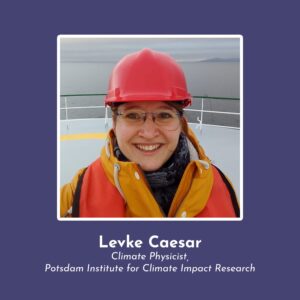
Show Summary
On this episode, Nate is joined by climate physicist Levke Caesar for a comprehensive overview of the Atlantic Meridional Overturning Circulation (AMOC) and its connections to broader planetary systems. Amid a complex and heavily interconnected climate system, the AMOC is a powerful force for regulating temperature between the Northern and Southern Hemispheres along the Atlantic Ocean – yet it’s estimated to have slowed down by about 15% over the last few decades. What are the possible domino effects of this slowing oceanic powerhouse at a regional and global scale? How well do we understand what drives the AMOC, its cyclical patterns, and connections with other currents? More importantly, how does the AMOC interact with other biospheric mechanisms that have shaped our stable, life-supporting planetary home?
About Levke Caesar
Levke Caesar is a climate physicist at the Potsdam Institute for Climate Impact Research, mainly known for her studies on the Atlantic Meridional Overturning Circulation (AMOC) and its pivotal role in the climate system. Her research primarily focuses on the past, present, and future evolution of the AMOC and its intricate interactions within the North Atlantic region. Caesar’s seminal work on the historical evolution of the AMOC has been featured in prestigious journals such as Nature and Nature Geoscience, garnering hundreds of citations. Since October 2023, she has assumed the role of scientific lead for the newly launched Planetary Boundary Science Initiative (PBScience) at PIK.
In French, we have a motto that says that a simple drawing is often better than a long explanation. Jean-Marc Jancovici Carbone 4 President
That’s very understandable because with left atmosphere thinking, one of the problems is that you see everything as a series of problems that must have solutions. Iain McGilchrist Neuroscientist and Philosopher
We can’t have hundreds and hundreds of real relationships that are healthy because that requires time and effort and full attention and awareness of being in real relationship and conversation with the other human. Nate Hagens Director of ISEOF
This is the crux of the whole problem. Individual parts of nature are more valuable than the biocomplexity of nature. Thomas Crowther Founder Restor
Show Notes & Links to Learn More
Download transcript00:00 – Levke Caesar, Potsdam Institute
What is the Atlantic Meridional Overturning Circulation?
04:27 – What are ocean currents?
05:40 – What drives the AMOC*
07:39 – Paleoclimatology of the AMOC
08:00 – Warning of a forthcoming collapse of the Atlantic meridional overturning circulation
08:27 – Henry Stommel
11:07 – AMOC slow down
13:26 – The AMOC engine is strongest in the winter
15:44 – The Ocean and the water cycle
16:25 – How we’re changing ocean salinity
17:50 – Greenland Ice sheet melting
18:13 – Ocean Stratification
18:36 – Aerosol Forcing, TGS Episode
18:55 – Aerosol forcing and the AMOC
20:25 – Potential for an AMOC collapse
21:53 – Climate Change scenarios
25:05 – How the jet stream affects weather patterns
25:18 – How AMOC and the jet stream interact
27:23 – Ocean has absorbed 90% of excess heat
31:28 – Other ocean currents
31:38 – Peter Ward, Under a Green Sky, Canfield Ocean + TGS Episode
35:22 – Oceans will eventually outgas carbon and heat
38:05 – Increase in winter storms over Europe with AMOC slowdown
38:45 – AMOC slowdown would mean sea level rise for the US
39:18 – Coriolis Effect
41:11 – The Day After Tomorrow
49:49 – First measurements of the AMOC
51:51 – 2004 continuous measurements of the AMOC, RAPID AMOC
52:54 – AMOC and the Gulf Stream
56:13 – How Climate Change affects wind patterns
56:55 – AMOC domino effect
58:33 – Twilight Zone
1:06:21 – Planetary Boundaries
1:06:48 – Most impactful climate actions for individuals
1:11:20 – Geoengineering doesn’t seem promising
1:13:42 – Plant-based diet and health, The EAT-Lancet Commission on Food, Planet, Health
1:14:24 – India planning to double coal production







